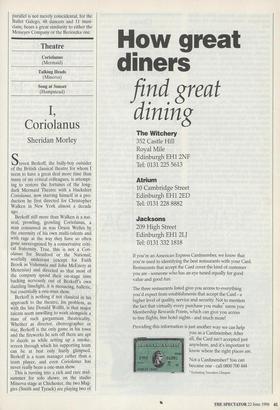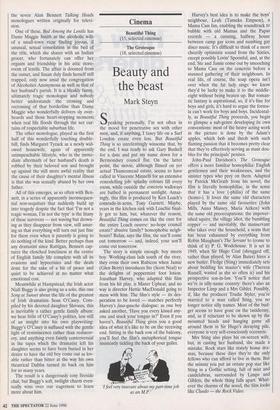Theatre
Talking Heads (Minerva) Song at Sunset (Hampstead) Coriolanus (Mermaid)
Coriolanus
Sheridan Morley
Steven Berkoff, the bully-boy outsider of the British classical theatre for whom I seem to have a great deal more time than many of my critical colleagues, is attempt- ing to restore the fortunes of the long- dark Mermaid Theatre with a Blackshirt Coriolanus, now starring himself in a pro- duction he first directed for Christopher Walken in New York almost a decade ago.
Berkoff still more than Walken is a nat- ural, prowling, growling Coriolanus, a man consumed as was Orson Welles by the enormity of his own multi-talents and with rage at the way they have so often gone unrecognised by a conservative criti- cal fraternity. True, this is not a Cori- olanus for Stratford or the National; woefully undercast (except for Faith Brook as Volumnia and John McEnery as Menenius) and directed so that most of the company spend their on-stage time backing nervously out of Berkoff's own dazzling limelight, it is menacing, balletic, but essentially a one-man show.
Berkoff is nothing if not classical in his approach to the theatre; his problem, as with the late Donald Wolfit, is that major talents seem unwilling to work alongside a man of such gargantuan theatricality. Whether as director, choreographer or star, Berkoff is the only game in his town and the fireworks he sets off there are apt to dazzle us while setting up a smoke- screen through which his supporting team can be at best only hazily glimpsed. Berkoff is a team manager rather than a team player, and even Coriolanus has never really been a one-man show.
This is turning into a rich and rare mid- summer for solo shows: on the studio Minerva stage at Chichester, the two Mag- gies (Smith and Tyzack) are playing two of the seven Alan Bennett Talking Heads monologues written originally for televi- sion.
One of these, Bed Among the Lentils has Dame Maggie Smith as the alcoholic wife of a small-town vicar finding joyous, if unusual, sexual consolation in the bed of the title, which she shares with an Indian grocer, who fortunately can offer her orgasm and friendship in his attic store- room of lentils. The affair is doomed from the outset, and Susan duly finds herself still trapped, only now amid the congregation of Alcoholics Anonymous as well as that of her husband's parish. It is a bleakly funny, ultimately tragic monologue and nobody better understands the crossing and recrossing of that borderline than Dame Maggie who wonderfully delivers sly over- heards and those heart-stopping moments when real life floods through the net cur- tains of respectable suburban life.
The other monologue, played as the first half of this wonderfully touching double- bill, finds Margaret Tyzack as a newly wid- owed housewife, again of apparently unimpeachable lifestyle, who in the imme- diate aftermath of her husband's death is robbed by their beloved son and brought up against the still more awful reality that the cause of their daughter's mental illness is that she was sexually abused by her own father.
All of this emerges, as so often with Ben- nett, in a series of apparently inconsequen- tial non-sequiturs that suddenly build up into tragedy despite the fact that 'I'm not a tragic woman, I'm not the type' is the litany of these survivors — not waving but drown- ing as they disappear from view, still assur- ing us that everything will turn out just fine for them even when it patently is going to do nothing of the kind. Better perhaps than any dramatist since Rattigan, Bennett cap- tures the clenched loneliness at the centre of English family life complete with all its evasions and hypocrisies and the deals done for the sake of a bit of peace and quiet to be achieved at no matter what emotional cost.
Meanwhile at Hampstead, the Irish actor Niall Buggy is also giving us a solo, this one Song at Sunset about the life of the greatest of Irish dramatists Sean O'Casey. Com- piled by his devoted daughter Shivaun, this is inevitably a rather gentle family album: we hear little of O'Casey's politics, less still of an insight into his own playwriting: Buggy's O'Casey is suffused with the gentle light of reminiscence rather than rediscov- ery, and anything even faintly controversial in the tapes which the dramatist left his daughter seems to have been buried in her desire to have the old boy come out as lov- able rather than bitter at the way his own theatrical Dublin turned its back on him for so many years.
The result is a dangerously cosy fireside chat, but Buggy's soft, twilight charm even- tually wins over our eagerness to learn more about him.



























































 Previous page
Previous page